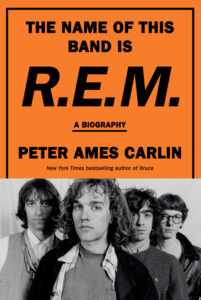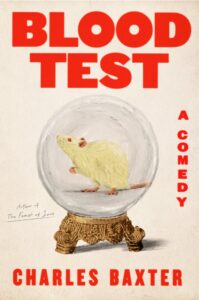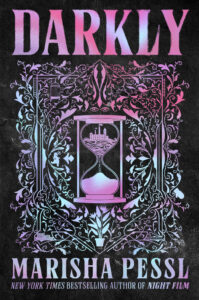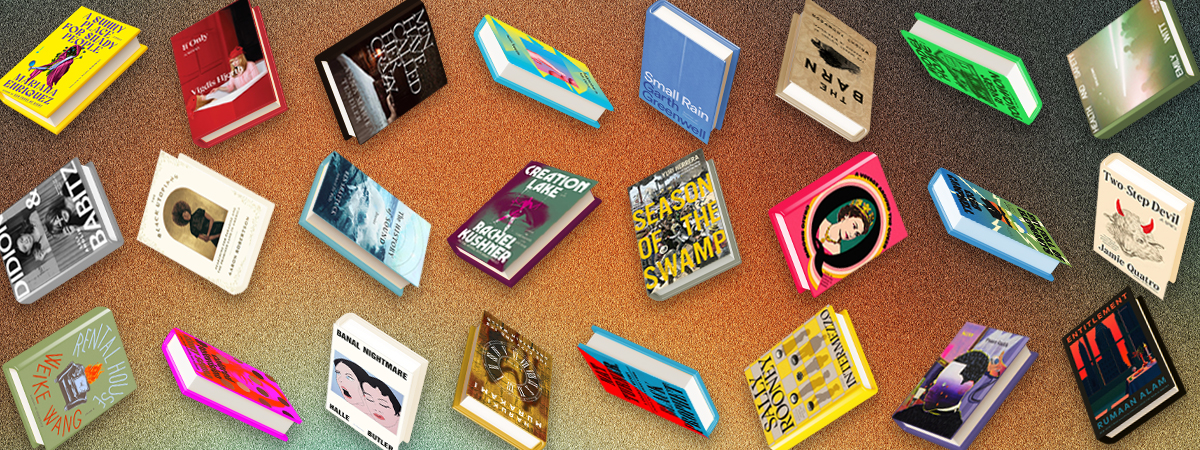
Lit Hub’s Most Anticipated Books of 2024, Part Two
193 Books to Read in the Second Half of the Year
November
Peter Ames Carlin, The Name of this Band is R.E.M.
Doubleday, November 5
R.E.M. was my first concert (youngest child privilege), and I maintain a deep love for the band, and its quintessentially 90s sound and ethos. Carlin’s cultural biography will undoubtedly be a fascinating look not just at the band but at the musical era, and make me deeply nostalgic. Luckily, as an elder Millennial, deep nostalgia is my jam. –JG
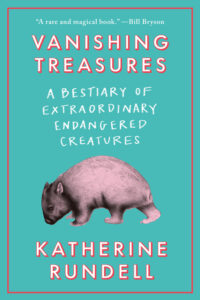
Katherine Rundell, Vanishing Treasures: A Beastiary of Extraordinary Endangered Creatures
Doubleday, November 12
Everyone knows about the seahorse: the males carry the young and they mate for life. But what about the American wood frog which freezes itself solid to survive the winter? Or the lemur, which “whenever they are cold or frightened, group together in what’s known as a lemur ball”? In Rundell’s new book, she explores 23 unusual and underappreciated endangered animals, presenting readers with the chance to “reckon with the beauty of the world, its fragility, and its strangeness.” –EF
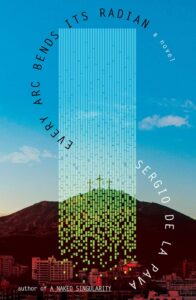
Sergio de la Pava, Every Arc Bends its Radian
Simon & Schuster, November 12
Sergio de la Pava is still best known for his thrilling, bizarre debut, A Naked Singularity, which won the PEN/Robert W. Bingham Prize in 2013 (some five years after it was originally (self-)published, funnily enough). Perhaps that will change with his latest, “an existential detective novel” about a philosophical PI who ditches New York City for Colombia and gets embroiled in a strange case. But even if not, we should be in for a very fun ride. –ET
Charles Baxter, Blood Test
Pantheon, November 12
A new book from Baxter, an American master, is always a cause for celebration—and this one sounds hilarious and off-kilter in the best way, following an ordinary middle-American divorced dad who takes a blood test and discovers that he has a predisposition to murder. I mean, sure! –DB
Marisha Pessl, Darkly
Delacorte Press, November 12
Pessl’s new one sounds like it follows in the footsteps of Night Film: a teenager lands an internship at a foundation furthering the legacy of a reclusive and brilliant video game designer… only for things to get strange along the way. A dose of formal derring-do is almost guaranteed and I can’t wait to dive into what’s sure to be a thrilling puzzle. –DB
Lili Anolik, Didion and Babitz
Scribner, November 12
Anolik first introduced readers to Eve Babitz with her book Hollywood’s Eve, a thoroughly intimate uncovering of a writer everyone had forgotten (a woman who had modeled for Marcel Duchamp, slept with everyone from Jim Morrison to Harrison Ford, and was “discovered” by none other than the patron saint of LA herself, Joan Didion.) After Babitz died, Anolik found correspondence between Babitz and Didion that shed new light on their complicated relationship (and the incredibly cutting line from Babitz: “Could you write what you write if you weren’t so tiny, Joan?”) In her new book, she paints these two writers side by side telling a story of the seventies, of L.A., and what it means to be a woman writer. So, are you a Joan or are you an Eve? That’s the question everyone will be asking each other this fall. –EF
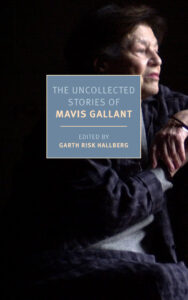
Mavis Gallant, ed. Garth Risk Hallberg, The Uncollected Stories of Mavis Gallant
NYRB, November 12
For too long considered a “writer’s writer” it’s high time Mavis Gallant took her place in the eternal pantheon of great short story writers alongside Chekhov and Cheever and Carver and Munro. Gallant was a master of leaving things out, of letting things happen off-stage; to read her is to experience the true art of writer-as-noticer. I can’t wait to dig into this. –JD

Richard Price, Lazarus Man
FSG, November 12
Price—author of Clockers and Lush Life, who also wrote for The Wire and The Deuce—sets his sights on east Harlem in his latest novel, where a five-story tenement building collapses, leaving chaos—and a lot of interesting characters—in its wake. This is exactly the kind of setup where Price’s skills (of ventriloquism, of evoking the city within the city) are likely to sing; read it before it becomes a television show. –ET
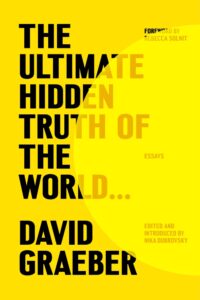
David Graeber, ed Nika Dubrovsk, The Ultimate Hidden Truth of the World…
FSG, November 12
The late anthropologist and radical author David Graeber enjoyed an especially loud fanbase in the last few years of his life–even though he’d been spinning out complex critiques of capitalism for decades prior. The Dawn of Everything, Graeber’s posthumously published history co-written with the archaeologist David Wengrow, has become a shelf flex in my circle. Which speaks as much to Graeber’s analysis as his readability. His books go down easy, even when the message is tough.
Mid-November, we’ll get a compendium of never-before-collected essays and interviews spanning Graeber’s long, deep thinking career. And I have a feeling we’ll need his courage and focus a lot, right around then. –BA
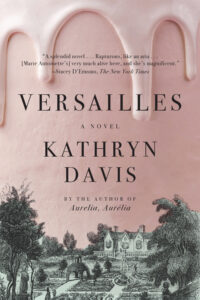
Kathryn Davis, Versailles
Graywolf, November 12
Having recently read Davis’ transcendent memoir Aurelia, Aurélia I’m fully prepared to follow her anywhere—particularly to Marie Antoinette’s Versailles. Originally published in 2002, the novel is being reissued by Graywolf (with a stunning new cover). To quote Stacey D’Erasmo’s review of the novel when it was first published, the historical protagonist is “very much alive here, and she’s magnificent.” –JG

Izumi Suzuki, tr. Helen O’Horan, Set My Heart on Fire
Verso, November 12
I can’t wait for the new Izumi Suzuki, her first novel to be released in English translation. Verso has put out two collections of her short stories, and both are excellent, filled with strange, funny, and tragic tales of the mundane and the supernatural—alien visitations, witchcraft, and bodies that resist time, as well as the pedestrian malaise and disappointments of life. Suzuki’s full-length Set My Heart on Fire takes place in the counterculture of 1970s Tokyo, full of rock and roll, drugs, and transgression. It’s a world Suzuki knew intimately: the punk icon was deep in alternative music and film scenes during her short but brilliant life. If you like the bang and crash of loud music, and the passion and desire it inspires, you don’t want to miss Suzuki’s writing. –JF
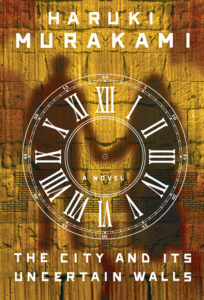
Haruki Murakami, The City and Its Uncertain Walls
Knopf, November 19
Attention English-speaking Murakami fans: after a painfully long wait, your time has come! According to its publisher, Murakami’s first novel in six years is “a love story, a quest, an ode to books and to the libraries that house them, and a parable for these strange post-pandemic times.” Sounds about right. –ET

Robin Wall Kimmerer, The Serviceberry
Scribner, November 19
Braiding Sweetgrass remains a perennial bestseller and for good reason: Robin Wall Kimmerer has tapped into something powerful in the way that she’s able to write about the natural world, the modern world, humans, animals, and history without ever breaking a sweat. This newest, about “abundance and reciprocity,” couldn’t be more timely. Let’s hope people not only read it, but take its wisdom to heart. –DB

Tove Jansson, tr. Thomas Teal, Sun City
NYRB, November 26
The Janssonissance continues (although it could be said that she never really went away) with NYRB’s latest reissue of this mid-’70s novel about a Florida retirement community and the people who live and work there. I can’t wait to see how her kind and beautiful prose depicts such a place. –DB
Emily Temple
Emily Temple is the managing editor at Lit Hub. Her first novel, The Lightness, was published by William Morrow/HarperCollins in June 2020. You can buy it here.









